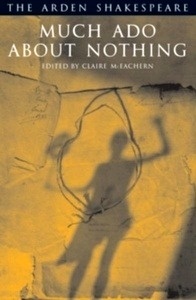Much Ado about Nothing

Resumen del libro
Much Ado About Nothing boasts one of Shakespeare's most delightful heroines, most dancing wordplay, and the endearing spectacle of intellectual and social self-importance bested by the desire to love and be loved in return. It offers both the dancing wit of the "merry war" between the sexes, and a sobering vision of the costs of that combat for both men and women. Shakespeare dramatizes a social world in all of its vibrant particulars, in which characters are shaped by the relations between social convention and individual choice.This edition of the play offers in its introduction and commentary an extensive discussion of the materials that informed Shakespeare's compositional choices, both those conventional sources and other contexts, from cuckold jokes to conduct books, which inform the ideas and identities of this play.
Particular attention is devoted to Renaissance understandings of gender identity and social rank, as well as to the social valences of Shakespeare's stylistic choices. A treatment of staging possibilities offers illustrations drawn from the earliest and recent theatrical practices, and a critical history examines the fate of the play in the changing trends of academic scholarship. "The text is superb...the critical introduction is predictably smart and engaging, exactly the sort of essay one would recommend to students."Eric Rasmussen, Shakespeare Survey
Biografía del autor
Nació en abril de 1564 en la ciudad inglesa de Stratford-upon-Avon (a la orilla del río Avon), a 180 km al noroeste de Londres. Su padre ocupó varios cargos en el ayuntamiento, así William pudo recibir una educación digna, aunque no llegó a la universidad. Muy joven, a los dieciocho años, se casó con una mujer ocho años mayor que él, con la que tuvo tres hijos. Su primer contacto con el teatro se produjo hacia 1587 en su propia ciudad, pues entró como ayudante en una compañía que se dirigía a Londres y con ellos parece que se marchó, sin su familia, haciendo de todo: cuidador de caballos, apuntador, tramoyista, y más tarde actor y autor anónimo. A finales del siglo XVI, los teatros se multiplicaron en todos los países de Europa con características similares: el mismo tipo de locales, la representación a primera hora de la tarde, público escandaloso, precios baratos y x{0026}lt;i subvencionesx{0026}lt;/i de los ayuntamientos. En Londres, el más famoso fue el x{0026}lt;i Teatro del Globox{0026}lt;/i , del que Shakespeare se convirtió en accionista y donde estrenó casi todas sus obras; este teatro se construyó en 1598 y ardió en 1613. Nuestro autor estrenó también en otros teatros. Retirado a su ciudad natal, murió el 23 de abril de 1616, la misma fecha de la muerte de Miguel de Cervantes. Hoy, en Stratford, se pueden visitar su casa, la iglesia de la Santa Trinidad, donde está enterrado y, sobre todo, el Royal Skakespeare Theatre, en el que la compañía titular de actores representa obras del autor todos los días.








